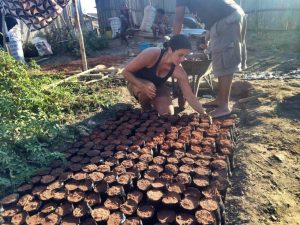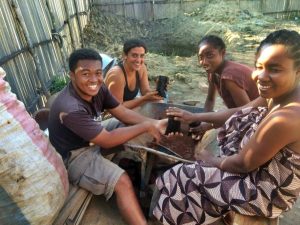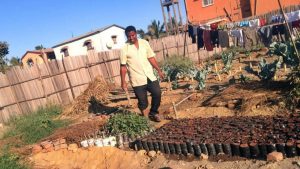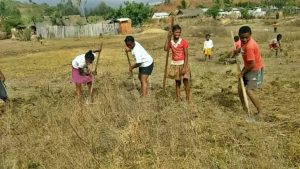This project is made possible through the partnership of WATER CHARITY and the NATIONAL PEACE CORPS ASSOCIATION. ![]()
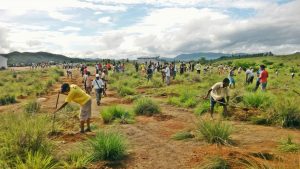 Location
Location
Mandritsara, Sofia region, Madagascar
Community Description
Mandritsara is a city and commune in northern Madagascar. It belongs to the district of Mandritsara, which is a part of the Sofia Region. The population of the commune is about 17,000.
Problem Addressed
Rapid deforestation in Madagascar has been a major cause of the loss of many endemic plant and animal species. It has resulted in soil degradation, erosion, and increased carbon emissions, and has had direct effects on the quality and quantity of food and water.
Madagascar has already lost about 90% of its original rainforest due to the slash and burn agricultural technique, along with local needs for cooking and building homes.
Project Description
This project is to build a tree nursery that will have a widespread impact on the health and nutrition of the community, create food security, increase the available water supply, and provide economic benefits.
The nursery will impact 100 communes in the region, each with about 3,000 people.
The work will be carried out under the direction of Centre de Service Agricole Mandritsara (CSA).
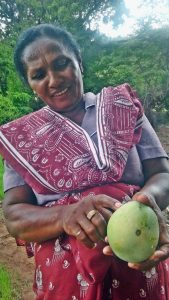 The planning, including conducting feasibility studies, preparing a business plan, and calculating expenditures and income, has been completed. The community has made a ten-year plan to reach even more people and communities after the project is complete.
The planning, including conducting feasibility studies, preparing a business plan, and calculating expenditures and income, has been completed. The community has made a ten-year plan to reach even more people and communities after the project is complete.
The project will begin by creating a place to grow the trees, a compost bin for a source of fertilizer, and other related physical improvements. This will be followed by the actual planting of the trees.
Approximately 2,500 trees will be planted and sold or given away each month. The trees that do not get sold that month will either be donated or planted locally.
Within 6 months, the tree nursery will distribute 15,000 free tree saplings to local villages, schools, religious organizations, and community groups.
Training will be conducted on basic business skills, such as bookkeeping, marketing, computer literacy, market, and product extension. This will serve to amplify the impact of the nursery project.
In addition, the implementation of a marketing campaign will make many people aware of the benefits of environmental protection, thus, compelling them to plant more trees in the future. People will be reached through training, radio advertisements, brochures, flyers, information packets, and strategically-placed posters.
Project Impact
300,000 people will benefit from the project.
Peace Corps Volunteer Directing Project
Astara Maiure
Monitoring and Maintenance
CSA will maintain and grow the operation of the tree nursery.
Comments
This project will provide solutions to many problems in the region. Environmental protection is essential for the well-being of the Malagasy way of life. Whether it is clean water, a source of fuel, or increased income through fruit sales, the benefits of planting trees are endless.
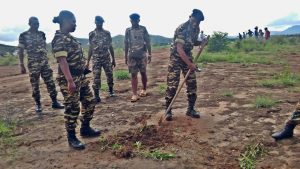 Trees play an important role in the water cycle. Their canopies provide shade to slow evaporation, and their root structures capture and hold the rainwater. The water then trickles down to the water table where it is available for use. Erosion from runoff, washing contaminants into the lakes, rivers, and streams, is controlled.
Trees play an important role in the water cycle. Their canopies provide shade to slow evaporation, and their root structures capture and hold the rainwater. The water then trickles down to the water table where it is available for use. Erosion from runoff, washing contaminants into the lakes, rivers, and streams, is controlled.
While other solutions are being implemented to prevent further cutting of the forests for fuel, this project at least serves to replenish to wood that is taken.
While thousands of trees are being planted each year, sustainable income-generating activities are being fostered.
This project is part of our East Africa Water and Sanitation Program.
Fundraising Target
$1,400
Funds raised in excess of the project amount will be allocated to other projects in the country.
Donations Collected to Date
$1,400
Dollar Amount Needed
$0 – This project has now been fully funded through the generosity of the Robert Victor Sager and Beatrice Mintz Sager Foundation.
Additional donations will be used for other projects in Madagascar.
This project has been completed. To read about the conclusion, CLICK HERE.
